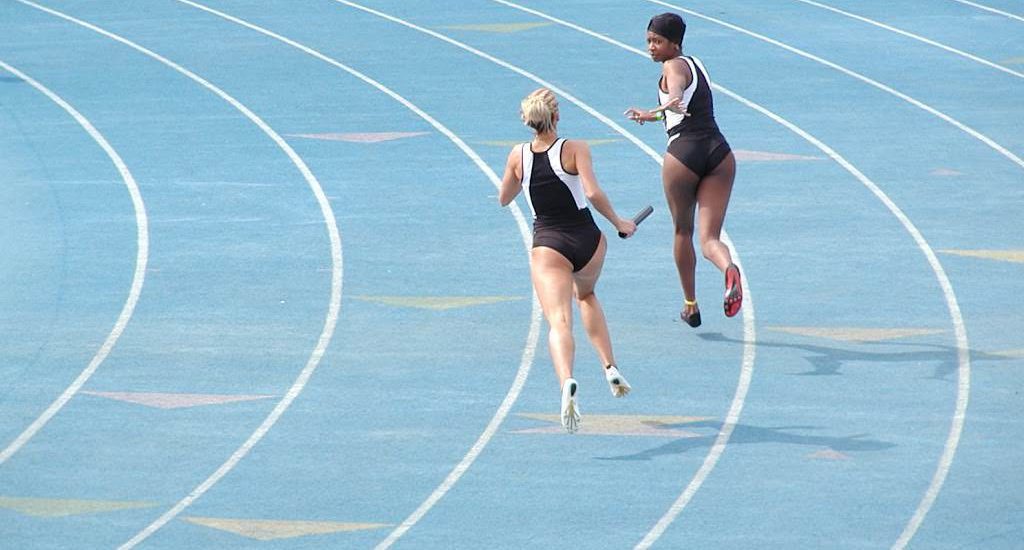Mission Monday: Passing the Baton

As members of Franciscan Mission Service’s Mission Class XVIII is in D.C. train for mission abroad, members of Mission Class XV prepare to return to the United States this holiday season. Joel Vaughn, who serves in Cochabamba, reflects on this transitional time.
 |
| Passing the baton. Stock image by Grace Yang. |
As Lynn and I complete the final months of our tour of service here in Bolivia, we see new missioners coming, and we hope that they find good relations both with their mission organizations, with the service sites where they choose to volunteer, and with the communities where they live.
I know this doesn’t always happen, but part of being on mission seems to be a willingness to work with less than perfect situations. I suppose we are all on mission, and in that sense I take seriously the adage on posters in the churches here, “toda mi vida es mision.”
We also find ourselves saying goodbye to those missioners who must leave now—I have yet to encounter anyone saying, “Boy, am I glad to get out of here”—and in doing so we see the time for our own farewells approaching.
A common metaphor for all of this to-ing and fro-ing is “passing the baton.” It implies an orderly transition in which the present momentarily unites the past and the future as that all important objective—whether a stick, or a water project, or the education of a group of young children—carries on. There may be more of these moments lately, or maybe I am just more conscious of them:
- An advanced English student at the carcel, the men’s prison, teaching English to the basic-level students at the carcel. He was doing a good job, providing just enough direction in Castellano to lead them in to English pronunciation, giving examples, but not losing sight of the components he was teaching, greetings and farewells. During this class a new young inmate poked his head through the doorway to see what was going on. He watched and listened, then started to leave. The advanced student/teacher called him back and asked if he wanted to learn some English. He nodded and took a seat in the back row. The advanced student encouraged the new inmate to move forward so he could see the whiteboard. He did, and soon he had a borrowed text, a pencil, and a sheet of notepaper. I hoped this would make some of his time there easier.
- A couple leaving the Eco-tourism program at Unidad Académica Campesina Carmen Pampa before the wife could finish because she had become pregnant, reminding me of another couple, who similarly restructured their plans about 35 years before.
- Visiting the Maryknoll Language Institute with friends just to walk through the quiet gardens and see the photos of the people who taught Lynn and me, and to say hello to a few of the current students there, missioners from the U.S. and various European countries, working to acquire that critical ability to communicate.
- Munching on a sandwich at Globos on the Prado as the 5-year-old campesino steps in to our gaze and begs for food, his plastic food bowl exactly the same as the one we have for Kitty, our domesticated stray cat.
- The Cochabamba woman who worked cleaning houses in Arlington, Va., until she was forced to return to Cochabamba with her three children.
- The young couple from Cochabamba that just returned to Arlington, Va., struggling to find work and some way to become legal residents this time.
I remember receiving and passing the baton during relay races: my teammate rounding the turn, referees adjusting lane assignments by place in preparation for the handoff, both teammates looking for a blink of eye contact amid the strain and stride of that leg’s final paces, the stretch of two arms, one forward with the hand clenched around the stick, one back with the hand outstretched, palm up, legs already striding as the tiring runner plunges into the zone.
Despite the pain of racing, it’s a blessing when the mission is as simple as getting the stick around the track as quickly as possible.
I’m reminded of a line from last week’s reading from the Book of Job: “The LORD gave and the LORD has taken away; blessed be the name of the LORD!”
What transitional or “baton passing” moments are you seeing in your life?
Tagged in:
